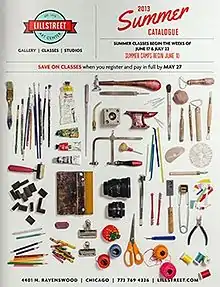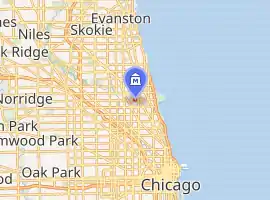Lillstreet Art Center
Lillstreet Art Center is an arts center in Chicago, Illinois, United States. It is one of the oldest and most successful co-ops in Chicago[1] and its facilities include classrooms for arts education, a gallery, an artist residency program, studio spaces, and a community outreach program.
 Lillstreet's 2013 Summer Class Catalogue Cover | |

| |
| Established | 1975 |
|---|---|
| Location | Chicago, Illinois, US |
| Type | Art Center |
| Director | Jessica Mott Wickstrom |
| Public transit access | Montrose and Ravenswood stop, Chicago Transit Authority |
| Website | www |
History
The center began as a ceramics studio in a renovated horse barn on Lillstreet in 1975, by clay salesman, Bruce Robbins.[2] It quickly outgrew its space and, in 2003, Lillstreet relocated to a former gear factory on Ravenswood Avenue, increasing its space from 12,000 sq ft (1,100 m2) to 40,000 sq ft (3,700 m2).[3] The new facility has added metalsmithing & jewelry, painting & drawing, printmaking, textiles, glass, and digital arts & photography.
Lillstreet also houses First Slice Pie Café whose proceeds help fund First Slice which provides more than 300 lunches to people in need.[3] First Slice also benefits from the annual Empty Bowls event which is hosted at Lillstreet and supported by Lillstreet potters who contribute bowls to the event.[2]
In 2012, a 400-square-foot (37 m2) green roof was installed at the center. It was designed as a gravel path with plants on either side.[4] In 2015, Lillstreet celebrated its 40th year in business.[3]
Gallery exhibitions
Exhibitions at the Lillstreet Art Center include,
- Reformat: Digital Fabrication in Clay combined traditional ceramic techniques with digital fabrication such as 3D printing and computer-controlled routers.[5]
- Neat: The Art of the Whiskey Vesselwas an exhibit of ceramic bottles, cups, flasks, jugs, and whiskey buckets.[6][7]
- 100 Acts of Sewing, an exhibit of the fiber artist, Sonya Phillip.[8]
- Graphic Noise: Gig Posters from the Chicago Printers Guild, an exhibit of Chicago-based printmakers.[9]
- Cairn & Cloud: A Collective Expression of Trauma and Hope was created by Corinne Peterson, and composed of clay and porcelain objects made by workshops members dealing with trauma and grief.[10]
- Before I Die…, was an outdoor, chalkboard-based, art exhibit that encouraged passers-by to fill in the open-ended sentence. Originally conceived by artist Candy Chang.[11]
- In the Penal Colony was Philip Glass' adaptation of Kafka's short story, staged by the Chicago Fringe Opera. The chamber opera was performed in the painting and drawing studio.[12]
References
- Hawkins, Margaret. "Hangs-On Chicago". American Craft Council. Retrieved August 7, 2016.
- Whitney Stoepel (March 20, 2010). "Empty Bowls At Lillstreet Art Center: A Tour". Gapersblock.com. Retrieved August 8, 2016.
- Frank EnYart (November 2, 2015). "Lillstreet Art Center celebrates 40 years". Columbiachronicle.com. Retrieved August 7, 2016.
- "Greenroofs.com Projects - Lillstreet Art Center Green Roof Project". Greenroofs.com. Retrieved August 8, 2016.
- "Chicago art exhibit features School of Visual Arts' Lauerman". News.psu.edu. June 8, 2015. Retrieved August 8, 2016.
- Thiel, Julia. "Whiskey, art, and art that holds whiskey at Lillstreet Art Center". Chicago Reader. Retrieved August 7, 2016.
- Cavanaugh, Amy. "Neat: The Art Of The Whiskey Vessel Opens Friday". The Chicagoist. Archived from the original on November 6, 2017. Retrieved August 7, 2016.
- Pierson - Cox, Haley. "Crafty Events: 100 Acts of Sewing at the Lillstreet Gallery in Chicago". MAKE Magazine.
- Cristiana Troli (December 2014). "A talk with Tracey Morrison". Artreachchicago.org. Retrieved August 8, 2016.
- S. Nicole Lane (December 11, 2015). "An Interview with Corinne Peterson: Healing the Split". Gapersblock.com. Retrieved August 8, 2016.
- Patty Wetli (May 3, 2012). "Before I Die…, the Ultimate To-Do List". Centersquarejournal.com. Retrieved August 8, 2016.
- John von Rhein (May 16, 2016). "Chicago Fringe Opera plunges into 'Penal Colony,' Kafka's dystopian nightmare". Chicagotribune.com. Retrieved August 8, 2016.